Rick Falkvinge's Blog, page 13
July 5, 2014
How Newspeak Makes Real Libertarian Thought Impossible In The US

United States – Zacqary Adam Xeper: The United States is an Orwellian nightmare, and I don’t mean because of the NSA. Over decades, we’ve destroyed the difference between the words “government” and “state.” This linguistic trick has made it impossible to truly understand what either of those words mean, or to realistically challenge the status quo.
The history of what’s now called “Libertarianism” in the US is rich with language-twisting and thought-constraining propaganda. The term “libertarian” itself is even a corruption of its original meaning. It had been used since 1858 as a synonym for “anarchist” — that is, belonging to the socialist, left-wing, anti-private-property anarchist movement dating as far back as Proudhon. This changed around the 1970s, as the right-libertarian founding father Murray Rothbard boasted in 1979:
One gratifying aspect of our rise to some prominence is that, for the first time in my memory, we, “our side,” had captured a crucial word from the enemy…”Libertarians”…had long been simply a polite word for left-wing anarchists, that is for anti-private property anarchists, either of the communist or syndicalist variety. But now we had taken it over…
This was the point at which capital-L “Libertarianism,” the right-wing aligned ideology of extremist individualism, antisocial paranoia, and a religious devotion to the gods of the market, came into its own.
Rothbard went on to say that this was more proper, because “we were proponents of individual liberty” and not the anarchists. To further make this point inarguable, the US Libertarian Party founder David Nolan created his famous chart:
The chart was sold as a more nuanced alternative to the one-dimensional political spectrum, because this one had two spectra: how much personal freedom you advocate, and how much economic freedom you advocate. The “left” were branded as advocates of personal freedom and not economic freedom, the “right” as advocates of economic but not personal freedom, but only the Libertarian Party advocated maximum personal and economic freedom.
The implication, of course, is that if you disagree with the Libertarian Party, you must hate freedom.
Nolan followed in Rothbard’s crusade against traditional libertarian socialism: there’s simply no place for it on his chart. Though classical anarchists identified with the left-wing of their time, it’s reductionist to say that libertarian socialism is opposed to “economic freedom.” But it certainly disagrees with the Libertarian Party definition of “economic freedom,” which is the freedom to own property and be an asshole about it. Alas, the chart’s accompanying “world’s smallest political quiz” takes the existence of private property, corporations, employment, and current social structures as a given. Anyone thinking outside of that paradigm is given a choice to advocate “freedom” and be branded a neo-Libertarian, or be against “freedom” and be branded a liberal.
It wasn’t enough to say that critics of Libertarianism were against freedom. As Libertarianism bled out from its fringe party and flowed into the mainstream right-wing of the Republican Party, rhetoric against the idea of “government” shot up. No longer content to criticize “the state” like the anarchists and libertarian socialists of old, the Libertarian right wanted to get “the government” out of their lives. First laws, rules, and regulations, but soon anything that even sounded like it could be somebody telling you what to do, all became “big government.”
Even as David Nolan and the Libertarian Party advocated for their own form of “self-government,” the idea got away from them and mutated into the monstrosity it is today.
To criticize “the state,” meaning an entity which has a monopoly on the legitimate use of violence in an area, is now interchangeable in the United States with criticizing “government.” Even when you drop the “the,” and refer to the abstract idea of “government,” the right-wing Libertarian way of thinking prevents any opinion but universal distrust and disgust.
In the US, “the state” and “government” have been newspeaked into the same word. We can’t have a reasonable discussion about how people can achieve self-government anymore, because right-wing Libertarianism has made the idea of governing anything taboo. If you’re for government, you’re an authoritarian socialist, and you can’t be a libertarian. If you’re against war and the police, you also have to be against food stamps and social justice. If you start talking about governance without the state, nobody can wrap their heads around what you’re saying. Make any reference to “the state” and people wonder if you’re talking about Louisiana or California. Because those are states, right?
Anyone who’s truly studied or paid attention to how communities operate in a stateless society knows that government is happening. Rules, codes, and standards of behavior — even if they’re unwritten — get enforced all the time in any situation where human beings come together. People enforce “vernacular law,” as David Bollier calls it. This is because government isn’t an institution, an organization, an entity, or any kind of single, concrete thing. It’s a process. It’s something we do, like science, dancing, magic, justice, warfare, or art. “The government” should rarely even be a grammatically correct combination of words.
Discussing that concept — the idea of people governing themselves, without the iron fist of the state — is essential for any realistic plan to achieve real, actual liberty for all of humanity. This was the ground first tread by the anarchists and libertarian socialists of the 19th century, and that tradition is being continued today by commons scholars, the alter-globalization movement, Pirate Parties, indigenous resistance movements, radical democrats, and more. The idea of self-governance is still marginalized and has an uphill battle around the world, but in the United States, we barely even have the language left to express it.

July 3, 2014
Freedom Of Religion Is Obsolete, Superseded, And Harmful

Civil Liberties: Freedom of religion was intended to guarantee freedom from governmental persecution because of private beliefs. Today, that freedom has been twisted and perverted into instead creating persecution against individuals, backed up by governmental force. It is time to abolish it as archaic and obsolete, and let the modern freedoms of opinion and speech take its place.
The recent case in the reactionary United States, where the corporation Hobby Lobby was allowed to deny healthcare to its (female) employees based on a reactionary superstitious idea that such healthcare for women should not exist at all, shows how freedom of religion is now used to create governmentally-enforced persecution and oppression, rather than freedom from such persecution and oppression.
In the Middle Ages, a different religion from the king and queen was no different from a subversive political opinion was no different from terrorism, and would get you tortured and killed. After a few centuries of that, “freedom of religion” was established to cement in stone that the government couldn’t persecute you for privately held opinions.
Today, the government doesn’t persecute you no matter whether you are praying for salvation to our All-Seing Allfather Odin on his majestic eight-legged steed, or to His Holy Noodliness, the Flying Spaghetti Monster. You may even believe that the Earth was created by your invisible friend or that the moon is made of fine cheese, all without persecution from the government. This is covered by freedom of opinion.
Further, freedom of speech makes sure that you have the right to express whatever strange beliefs you hold in whatever form you like (but not on any platform you like or with any audience you like, which is a common misconception: you can’t force anybody to listen to you, nor force anybody else to carry or repeat your expression).
The rights to hold any belief you like and to tell others about that belief are fully covered by the freedoms of opinion and speech. They have completely superseded the original freedom of religion.
You have the complete freedom to believe that the moon is made of Emmenthaler Cheese (freedom of opinion) without being persecuted by the government. You also have the full right to argue with your neighbor, who believes the moon is made of Gouda Cheese instead, about this (freedom of speech), without governmental persecution for doing so.
Your right to hold this belief, however, does absolutely not entitle you to re-label Emmenthaler cheeses at your local supermarket, where you work, as “Authentic Holy Moon Cheese”, and to call in the government to enforce this opinion of yours against your employer’s business. This is how “freedom of religion” is being abused today, and much worse:
The abovementioned case where an employer denies healthcare to female employees, using governmental force to back that denial up
Employees who refuse to shake hands with female customers (yes, these exist)
Abortion nurses who refuse to perform abortions “for beliefs”, including when lives are at risk
People who refuse to work with X (lotteries, pork, hot dogs, whatever) because of “beliefs” and demand to stay on unemployment benefits instead (note: refusing a job offer while on unemployment insurance normally ends your right to further unemployment benefits)
Refusal to follow hygiene procedures in food/healthcare because of “beliefs”
Teachers who refuse to allow students (citizens!) to critically examine the information they’ve been given
Parents who do the same to their children (also citizens!)
…and don’t get me started on infant/toddler genital mutilation, male and female alike. Your right to believe whatever crazyfuckery you want will never, ever, extend to any insane right to cut into the flesh of another citizen and deliberately remove functional tissue, regardless of DNA similarity.
…the list goes on.
Freedom of religion was intended to allow you to believe whatever you wanted. It was never intended to legitimize people behaving like assholes against fellow humans and claiming they have a governmentally-backed right to behave like assholes without consequences, because of some weird opinion they hold.
In particular, freedom of religion was never intended to exempt somebody from the law.
Freedom of Religion is used to persecute individuals once again, using governmental threat of force to back up such persecution. It is time to abolish it in name and concept, and instead let the Freedoms of Opinion and Speech carry on its original intention.
Image: midsection of the painting “The Execution of Jeanne d’Arc at the Stake”, Hermann Stilke

June 22, 2014
Why Buying Photoshop Instead Of Pirating It Is Ethically Wrong

Swarm Economy – Zacqary Adam Xeper: Companies like Adobe that make propirateary creative software in order to charge licensing fees see themselves as selling products to a market, and see people who don’t pay as thieves. But creativity isn’t a market, it’s a commons, and Adobe, et al. are really just leeching instead of cooperatively participating in it.
At this point, you’re probably expecting me to go into a bleeding heart hippy-dippy rant about how information wants to be free, maaaaan, and that everything that we make we should just, like, share, man, because that would be groovy. While that’s all absolutely true, you’ve probably heard and rolled your eyes at it before. So let’s take a look at this from a more down-to-earth perspective, rather than down-to-Gaia or whatever.
From Adobe’s point of view (which is, of course, an example, and you should feel free to replace them and Photoshop with any other propirateary software that’s used to create stuff), they’re selling a product to the market. Their product, Photoshop, is a tool that lets you manipulate and create images in millions of different ways, which is a fantastically useful capability if you’re designing a book cover, creating visual effects for a movie, making graphics for a video game, building a website, printing business cards, taking a photo of an already beautiful woman and turning her into an impossible alien-like creature with unreasonably small hips and ridiculously shiny skin so that she fits the ludicrous standards of a fashion advertisement, or hundreds of thousands of other creative things that could potentially make a lot of money.
So, because you might, maybe, possibly, at some point be making a lot of money from the work you make with Photoshop, Adobe assumes it’s completely reasonable to put a very, very high price tag onto it, and then eagerly sits there like a spoiled puppy awaiting your payment. If you use Photoshop without paying, Adobe will bark, growl, and pee on the floor — in other words, lobby national governments to pass laws branding you as a thief and a scoundrel.
Ignoring the fact that Adobe is trying to sell access to a non-scarce, infinitely reproducible product — that is, the zeroes and ones that make up Photoshop — and also ignoring the fact that Adobe is a bad puppy dog that has been bad, very bad, and needs to go lay down in the crate right this instant, their point of view is at least coherent. Adobe firmly believes that they are selling a product that they’ve worked very hard on, and that if you take it without first buying it, then you’re stealing. From their point of view, and their understanding of how the world works, this makes sense.
My problem with Adobe is that I didn’t even know we had a king. I thought we were an autonomous collective.
Let’s say instead of using propirateary products like Photoshop, Maya, and Windows, I created a project using free software like GIMP, Blender, and Linux. Then I make a decent amount of money from this project. Now, I didn’t pay a cent to the foundations and volunteers that worked to bring me GIMP, Blender, or Linux. I really should, though, shouldn’t I?
Free software makers understand their role not as selling products to a market, but contributing tools to the commons. They put their work out there, free and unrestricted for anyone to use, and they make the world better for everyone. Ethically, if I get wealthy from their work, I should spread the wealth and kick it back to them.
That’s why I’ve donated to commons-contributing foundations like Apache and Wikimedia, and use Flattr and Gittip to support certain open source programmers, after I make some money from the work that I do standing on their shoulders. Ideally, when you start out on a creative project, I’d recommend you pick a percentage of your future revenue and pledge to give that to all the free software and free resources that you make use of. That’s my point of view, my ethical stance.
From my point of view, Adobe is asking me to shell out a portion of my future revenue before I’ve actually made it.
See, that’s just disrespectful, is how I see it. Adobe believes they’re so high and mighty, so damn important, that they can just hoist themselves above the rest of the commons and demand that we pay tribute, regardless of whether we’re able to, regardless of how much their work actually ends up benefiting us, and basically regardless of any sense of social responsibility whatsoever. Adobe is violating the rules of the commons. They’re trying to take from it without necessarily putting anything back in. Who’s the thief now, Adobe?
It’s ethically wrong to abide by Adobe’s demand to be paid, because they don’t care about how much money anyone has, or how healthy the supply of money is in the commons, and that kind of attitude is toxic for everyone.
Now, you might say, “Oh come on, Zacqary! You can’t just impose your ethics and your worldview here! You’re not in a revenue-sharing arrangement with Adobe!” To which I’d reply, “Yes I am.” And then you’d say, “No, Zac, they’re in a market, and you’re in a market, and that’s the way the world works!” And then I’d say, “Says who?” Because, didn’t you just say that I can’t impose my ethics on Adobe? Why do they get to impose their ethics on me? And then you’ll say, “Everyone else sees the world this way, and your ethics are dumb and you just don’t want to pay for things,” at which point you’ll be interrupted of the dinging sound that my torrent downloader makes because a full, DRM-free version of Photoshop has just finished downloading onto my computer, all without giving Adobe a cent.
When two different ethical stances butt heads against each other, neither of them can be objectively right. It’s ethics, not physics. You can’t look into a microscope and find Right Particles and Wrong Particles. Throughout history, the ethical stance that wins is usually the one that belongs to the people who have power.
And right now, the people with power are the pirates. Because we’ve got the torrents, we can crack the DRM, and we can encrypt our traffic to create plausible deniability. So our ethical stance is going to be the one that survives in the end, because it’s not like anyone can stop us.
But the ethics here are deeper than “lulz we pwn3d ur shit 4 free,” because, come on, human beings aren’t actually that sociopathic. We share files, and we’re more than happy to share money in a way that makes any sense. That way is not the arrogant “pay now, maybe benefit never” logic of the market. It’s commons logic, the kind where people care about their relationships to one another, and work together for everyone’s mutual benefit.
If, like Adobe, that’s not the game you want to play, you can feel free to get torn apart in the market. Because tearing you apart is the right thing to do.

June 18, 2014
Flattr: Decentralized Payments Paving A Roadless Web

Swarm Economy – Lionel Dricot: Peter Sunde, recently arrested for having been the spokesperson of The Pirate Bay, is lesser known for co-creating Flattr. The fact that Flattr is often forgotten by the media is a clear illustration about how the society doesn’t protect the artists or the citizens. It is now obvious that the copyright establishment fights only to keep its own power.
For years, copyright industry lobbyists have been trying to describe pirates as selfish and greedy, downloading movies only to save or to make money themselves out of the sweat of others. But reality shows that Pirates are often willing to support their favorite artists. They just don’t see the need for an useless third party.
It is a little known fact that, after the trial of The Pirate Bay, Peter Sunde co-created a web service called Flattr. The goal of Flattr? Making it easy to support the content you like on the web.
The way it works is quite simple: create a Flattr account, send some money on it and choose a monthly budget between 2€ and 250€. Then, click on Flattr buttons you cross during your journey on the web. At the end of the month, your monthly budget is divided by the number of clicks. That way, creators get some money and you keep your expense under tight control. I’ve called that “The Paying Web“.
If Flattr was not an overnight worldwide success, mainly due to a chicken-and-egg problem, it is still quite popular, mainly in the German podcast community. In fact, at the bottom of every post on this website, you can find a Flattr button. So why not create an account right now and offer your first Flattr to Peter Sunde, as a way to support him?
If Flattr is often seen as a simple anecdotal tool, it is part of something bigger, a complete shake-up of the way we perceive money or consumption. The ability to pay a Free Price, instead of being coerced into a fixed price, deeply modifies our perception of value. We understand more what and who we want to pay, we try to get rid of useless middlemen like we do any obsolete business model.
The established lobbies have been fighting this change since the start. No famous well-established artist from major labels ever signed up on Flattr or Patreon, despite money waiting for them! Flattr integration is even forbidden on any application on the App Store.
But, in the long term, that doesn’t matter. With Bitcoin and technologies like Ethereum, you can build completely decentralized platforms. In my short story “The Blogger from Tomorrow“, I explained how such a platform could basically make any formal organization, any company or any bank account useless! Not to mention how it could change our democracy.
The question is not whether such changes will happen or not. They already are, like the incredible way OpenWhisperSystems is handling its donations. You can’t stop the future. The real question is “how to handle the change gracefully”? And that’s why people like Peter Sunde are essential to our society. While The Pirate Bay exposed a flaw in the system, Flattr was an answer. Or at least the start of one. Problem. Solution. A true Pirate spirit.
Any honest man can understand how people like Peter Sunde are good for society. But we are not dealing with honesty. We are dealing with selfish minds corrupted by power. Minds who are ready to do anything to keep their power. Minds who will try to block every possible road to a better world.
Fortunately, we don’t have to wait for them. Because, where we are going, we don’t need roads.

May 26, 2014
Solar Roadways, Please Learn From Oculus’s Mistake And Become A Co-op

Swarm Economy – Zacqary Adam Green: Solar Roadways has officially become another crowdfunding sensation. They’ve raised over $1 million USD on Indiegogo from over 25,000 people around the world, all to fund research, development, and production of solar panels that can be used to pave roads. This is amazing. This is wonderful. And it could all be soured if we hear in two years that they’ve sold out their backers and been bought by General Electric.
We’ve seen this movie before. Revolutionary startup turns to crowdfunding, thousands of people contribute, then two years later the startup gets sold to a huge corporation for billions of dollars and the backers get nothing. No say in the decision, not even a cut of the profits. This is what happened when Kickstarter-darling Oculus VR sold to Facebook.
Oculus’s backers were, understandably, furious.
The $2 million which the backers had collectively raised had all just served to make a few key Oculus people and investors very, very rich. If Oculus had been selling shares of stock, and their 9,522 backers had each bought in at an average of $210, then they’d each have $210,000 after the Facebook sale. These aren’t exact numbers, given that Oculus took extra venture capital after their crowdfunding campaign, but the principle is the same: the Oculus board and VCs made out like bandits, and the backers got shafted.
But it’s not really about the profits.
If this kind of a scenario were to happen with Solar Roadways, the backers would have even more of a right to be furious. Many of Oculus’s backers contributed money to receive a developer version of their VR headset, so these instances at least had the pretense of preordering a product. Solar Roadways, on the other hand, isn’t selling functioning solar panels to backers. At most they’re offering commemorative gifts like pieces of artwork or coffee mugs; the sort of thing you’d expect from a local public radio station’s fundraiser. And as of this writing, 30% of Solar Roadways’s backers haven’t elected even to get a bumper sticker, and are just giving a pure donation. None of the Solar Roadways backers are in this because they want to make money. They’d probably be shocked to find out that its founders are.
For a company that’s doing a not-for-profit-style fundraiser, you’d expect them to actually be a not-for-profit.
Judging by this investor-courting page that’s since been removed from the navigation bar on Solar Roadways’s website, it’s clear that they, at one point, planned to seek venture capital. Now that they’ve raised a million bucks through crowdfunding, they really ought to consider another option.
There’s still a legal minefield around giving equity in a company to crowdfunders, so it’s understandable why Solar Roadways isn’t offering a return on their backers’ investment in the event that they get acquired for billions of dollars in the future. The backers aren’t even interested in that return on investment anyway. But there’s another solution that’s in the exact same spirit of Solar Roadways’s stated goals of being revolutionary and sustainable. They could reorganize as a cooperative.
The Solar Roadways backers should have a right to dictate the company’s future. They can enable this by giving every one of their 25,000+ backers a right to vote on company decisions. One person, one vote, are how cooperatives work; it’s not related to how many “shares” anyone has. There’s already tried-and-true legal structure enabling a cooperative’s “customers” to become its members, and Solar Roadways can make use of it.
Really, this is all the Oculus backers ever wanted. The fact that they didn’t get a slice of the 2 billion dollar pie stung, sure, but the real injury was the fact that their company — the one they felt and believed they had a stake in building, which is basically the entire appeal of crowdfunding — had been taken away from them.
By promising its backers not a share in the profits, but a say in its direction, Solar Roadways can ensure that it always lines up with the public interest in its mission to pave the world’s roads with renewable energy, and that its owners or other investors are never able to compromise that mission in any way in the pursuit of their own profit. It would be fitting if the company that hopes to literally pave the way for ecologically-sustainable energy also had a more ecologically-sustainable business model. After all, the social and financial world are ecosystems too.
In becoming a cooperative, would Solar Roadways scare away self-interested VCs and investors? Probably. That could be a challenge for a project as massive as paving solar panels into millions of miles of roadway. But they’ve already achieved amazing things on a shoestring budget, and now, especially, by depending on the power of a big swarm of enthusiastic people. Who’s to say they can’t go even further by doubling down on that?

May 25, 2014
Pirates Are Staying In European Parliament

Pirate Parties: As of 18:00 on Election Day, it is clear that the Pirate Party remains in the European Parliament for another term. The German exit polls predict that at least Julia Reda from Germany has just been elected as Member of European Parliament, securing a pirate seat for the coming term. More results as they come in (developing story).
In the past five years of the 2009-2014 term, having two pirates in the European Parliament – Christian Engström and Amelia Andersdotter – has been absolutely vital to civil liberties in Europe, and sometimes even worldwide. Without these two individuals, ACTA would now have been in effect worldwide, there would be a three strikes scheme across Europe, and European net neutrality could have been in grave danger. Additionally, a copyright monopoly reform proposal has gone from the radical fringe to the real mainstream. Two pirates in the European Parliament have accomplished an enormous lot in the past five years.
So as of 18:00 on election day, we know that at least one German pirate will continue that work for the coming term, defending civil liberties for the net generation – and the preliminary results from Germany are very close to a second seat, with Fotios Amanatides taking a MEP seat as well, so the story is developing.
It is still unknown whether the Swedish pirates Andersdotter and Engström are getting re-elected from Sweden, the uncertainty coming in no small part due to having been deliberately omitted from contender lists by Swedish oldmedia. Polls have been very close to projecting at least one Swedish seat, and the first exit polls are expected at 22:00.
We’re also eagerly anticipating results from the other 14 European countries where pirates are running, from Austria to the United Kingdom. But for now, we know at least that pirates are staying in the European Parliament.
Update/Summary
Update Monday 0600: The movement remains in the Europarl, but with just one seat in total, that seat from Germany (Julia Reda).
The Pirate Party from Sweden lost their two seats, the Czech Republic fell just short of the finish line for a seat with 4.78% of the vote with 5.0% needed, and Germany won the one seat coming very close to a second. This election could just as well have been three seats in the Europarl, but it turned out to be one. Still, one is much much more than zero in these matters.
Austria, Luxembourg, and Slovenia also had notable results, with 2.1% (4.0% threshold), 4.23%, and 2.57%, respectively. While not enough for a seat, these are strong numbers in themselves.
The Piratenpartij Nederlands got 0.8%, which is not enough for a seat in the Europarl, but which notably is enough for a seat in the Dutch national parliament.
So where just one country’s Pirate Party had a notable score in 2009 – Sweden at 7.13% – this election saw seven Pirate Parties with notable election results. That’s a strong improvement. A painfully slow improvement, since it didn’t result in seats, but the political world tends to be that painfully slow for people coming from the Internet.
Live Updates
Updates below through the election night. No need to refresh; the page will update by itself.
May 26 06:53 - Closing: the European Pirate Parties grew significantly, having seven parties with a strong showing rather than just the one Swedish party five years ago. Still, we went from two seats to one. New summary written in an article edit (liveblog ends).
May 26 02:11 - Unconfirmed reports say that the German Piratenpartei was 0.08% (zero point zero eight per cent) short of the bar for a second seat.
May 26 02:10 - Pirates in Czech Republic finished at 4.78% with 5.0% needed to pass the bar for seat allocation, so the Czech Pirate Party fell just short of one seat.
May 26 01:01 - As the vote count stabilizes, it appears final that the German Piratenpartei has won one seat and one seat only. The Czech Republic is still open.
May 25 23:04 - First Swedish election results project the Swedish Piratpartiet at 2.2%, slightly below the exit polls. This confirms that the Swedish Pirate Party has lost both seats in the European Parliament.
May 25 21:01 - Exit polls published in Sweden. The Pirate Party is projected to get 2.5% of the votes. That is not enough for a single seat, and it’s very unlikely that this can be caught up as the votes are counted.
May 25 20:56 - According to Sampo Smolander in the comment field, Finland is not taking any seats with 0.5% of the votes.
May 25 20:53 - The lowest score in Germany that gave a seat was 0.7%. The German Piratenpartei is projected at 1.4%, suggesting that they are very very close to a second seat.
May 25 20:52 - Swedish exit polls are expected at 2100, in seven minutes. That’s the first gate we need to pass. If the exit polls are in the 1-2% range, achieving 4% is tough; if it’s 3-5%, the rest of the night is a nailbiter.
May 25 19:14 - It’s going to be a while until results come in. Expect meaningful news at about 2200.
May 25 18:36 - Exit polls in Germany predict between 1.3 and 1.5 percent for the Piratenpartei, securing one seat and closing in on a second. We’ll also need to pay close attention to Sweden, Czech Republic, Slovenia, and Finland as the night progresses.

May 22, 2014
“Why I’m Voting Pirate” – A Testimony From An Ex-Soviet

Privacy: This testimony – “Why I’m Voting Pirate” – was published by Leila Borg, a person who grew up in the Soviet Union but moved to Sweden after the fall of the Iron Curtain. It has been translated to English and reposted here for a wider audience.
Act 1. Two-bedroom apartment in Moscow. Mother/daughter.
I was ten years old, and suddenly accused of having smoked in secret. My mother had found a cigarette butt floating in the toilet. It wasn’t me, and after discussing for some time, I managed to convince my mother of this fact. At that point, she got scared, and ran out to the drawers with our important papers and our money. I remember the composure she tried so hard to put up. All the money was there, but some private letters were in a slightly different position than how they were usually arranged.
Many years later, I learned that this only meant one thing: our home was being searched by the KGB. It wasn’t the first time, and every single trace left behind was deliberate. Somebody was “nice” and gave us a sign to be extra careful. For years, my mother carried the burden alone. Violated, disgusted, scared. She didn’t even dare tell her closest friends.
Act 2. Schools and streets in Moscow. Two friends.
The year was 1987. Two schoolgirls were rummaging through all the newspapers, watched all the newscasts. The words perestroika, glasnost, and freedom inspired and we were as happy as only twelve-year-olds can be. We tried to re-educate our teachers and make them read Sakharov and Solzhenitsyn, we planned our future and founded our own political party. Every day after school, we climbed onto the garage roof nearby and wrote flyers. “Get RID of the communists!!!”, “Get rid of the KGB!!”, “Yes to reforms!”, “Party rule no, Real democracy yes!”, “Yes to FREEDOM!!”. It was still somewhat dangerous, and therefore all the more appealing. We swapped jackets with each other to be harder to recognize, tiptoed about, kept watch, and glued, glued our flyers everywhere. Every time people gathered around our calls and talked about them, we felt exhilarated. I was flying with hope. I miss that time now, that spirit. Freedom felt so close!
Act 3. Moscow, 1990s.
Rallies and protests had turned into pointless gatherings. Glasnost was miscredited, with EVERY newspaper being owned by ONE oligarch. Economic reforms led to a select few people becoming disgustingly rich at the expense of the whole population. Freedom had turned into corruption. “Democracy” appeared to mean that you were allowed to open fire at the wrong parliament and burn it to the ground. Friendships with Western democracies led to national debt, dumping of surplus production, and robber-baron deals. Protests against propaganda led, among other things, to an extreme repression of women. In 1992, I moved to the democratic Sweden.
Act 4. Stockholm, 2014. Quadruple-election year.
Start of the new Cold War. Being Russian today means having to always defend Russia against everybody confusing Putin with the 200 million other people in the country. Are we freer in Sweden? Nobody is rummaging through my drawers (I think)… but my phone may be wiretapped, my mail might be read, my Google searches could be logged. I choose to be relatively open on my blog. That’s a choice I make. What’s being done to safeguard my privacy, when I choose to not be open?
A man presents evidence of a foreign power collecting the private data of Swedish citizens, and after after a few compulsory groans, nobody reacts any longer. What does the apathy say about our society? I don’t see any difference between the KGB who searched our apartment and the NSA searching my electronic life.
My mother had nothing to hide, I have nothing to hide. That still gives nobody the right to search through our private files.
Therefore, I vote for the only political party that considers this apathy to be a problem for democracy as such, that wants to shine light on shady power dealings, and keeps fighting an uphill battle for our right to privacy.

May 19, 2014
The Pirate Bay Running Promos For European Pirate Parties In Election Week

Pirate Parties: In a last-minute visibility boost, The Pirate Bay is providing front-page exposure to the European Pirate Parties in this European Election. Offline-borns would tend to scoff at this; however, the net generation understands that this is an enormous amount of exposure, corresponding to buying the full cover of every newspaper, every day of the campaign, in the respective countries. This is The Pirate Bay lending a hand to the political arm of the movement.
Late Sunday, a generic hackerish Pirate Party ad took the place of the well-known Pirate Bay logo:

However, it turns out this was just an appetizer for the things to come.
Midnight to today Tuesday, country-specific promos for the different European Pirate Parties are fronting The Pirate Bay. It’s interesting to compare them, especially as you can’t easily see the different versions without proxyhopping.
Germany
First, the contribution from Germany‘s Piratenpartei:

Stylish, and very in line with the German Piratenpartei‘s profiling overall. A lot of pirate parties seem to have remixed Germany’s promo for their own version on The Pirate Bay –
Netherlands
Netherlands and the Piratenpartij:

Belgium
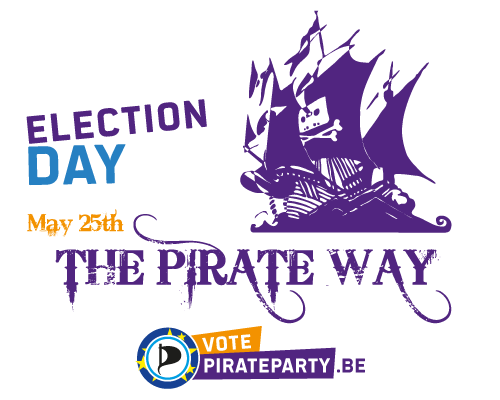
Greece

Spain
Spain‘s differs a bit but is still similar in style:

Sweden
Sweden, meanwhile, goes all-out with a large animated GIF that keeps a consistent style with the Swedish Pirate Party’s re-election campaign for the European Parliament. The animated text says, “It’s better to replace laws than to break them. Vote Pirate for the EU. Our voice is your voice in the EU.”

United Kingdom
The United Kingdom‘s Pirate Party has more of a direct message:
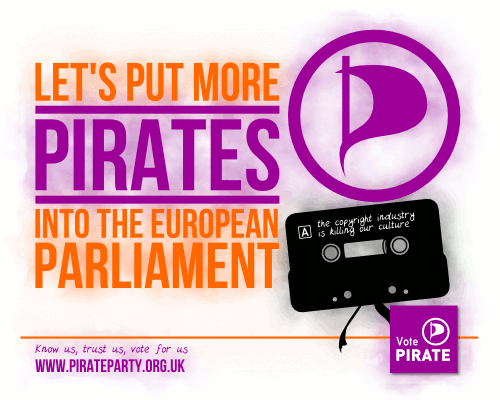
Czech Republic
The Czech Republic‘s Pirate Party continues their “Europe is our Sea” campaign:
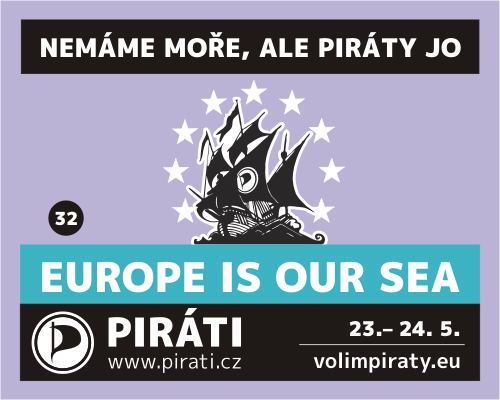
Luxembourg
Luxembourg, alongside Sweden, stands out by actually showing a bunch of people.
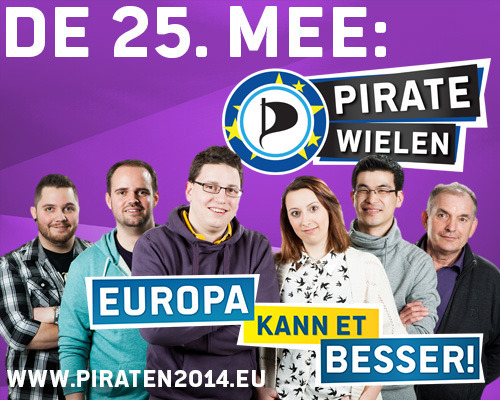
Slovenia
Interesting style that stands out in the crowd.
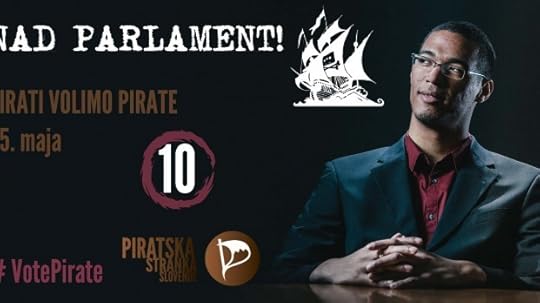
France
France‘s Parti Pirate also has a distinctive style, saying “the NSA already knows you’re voting for us”:

Finland
Last but not least, Finland‘s Piraattipuolue comes full circle and campaigns for the previous spokesperson of The Pirate Bay itself, Peter Sunde, promoting his election to the European Parliament.

An enormous thank you to The Pirate Bay for this contribution to the success of our joint mission for civil liberties and a free net.

Election Week, Swedish And Czech Pirate Parties Liftoff In Polls

Pirate Parties: Last Friday, Swedish Public Radio opened with the headline “Swedish Pirate Party Heading For Re-Election To European Parliament” as a fresh poll was published. This was followed by similar news from the Czech Republic. As election week opens, more is up in the air than ever – but things are looking overall positive for the movement.
The Pirate Party narrative is crucial. In hindsight, the story must read that political representation changed permanently as sentiments in the younger population shifted toward safeguarding civil liberties, and that scenario requires pirate MEPs in European Parliament after the elections. The alternative, losing all seats, would signal that people weren’t interested in civil rights after all, especially online, and that the original pirate election in 2009 was mostly a freak random occurrence.
Fortunately, there will be Pirate MEPs in the European Parliament after this week’s elections – from the German Piratenpartei. The main narrative requires that pirates remain in the Europarl; it’s secondary what state they are elected from.
But lately, things have started looking up for pirates in more states.
Swedish oldmedia has done its utmost to make sure the Swedish Pirate Party isn’t re-elected, by ignoring it wholesale. In every list of “parties” leading up to the European Elections, those “parties” have been selected from a distinctly different group – those in national parliament, deliberately omitting one of the eight political parties in the European Parliament.
And yet, polls have been looking sharply upward from 1.x% a month ago to 3.1% early last week. Then, on Friday, the polls hit 3.9%, with 4.0% required for re-election:

Swedish Public Radio: Headline “Pirate Party stays in European Parliament”. Poll giving the Pirate Party 3.9%.
The race for the Swedish Pirate Party is definitely still open as we enter the actual election week for the European Elections, with 3.9% on an upward trajectory obviously looking very encouraging. Meanwhile, things are looking good for other pirate parties in Europe, too:

The Czech Pirate Party keeps showing potential. Here a frame from a TV show, showing at 6.5%.
The Czech Pirate Party, headed up by Ivan Bartos, is currently polling at levels that would give them one or two seats in the European Parliament out of the 22 Czech seats. This would be a very insipiring sign of the movement’s overall growth.
There’s also news that the pirate party in Slovenia is polling at over 4%, but that’s not enough for a seat from that country (due to its small size).
So while this race is nowhere finished, we can say with certainty that pirates are going to be in the European Parliament after this election. As it currently stands, it looks like 1-3 from Germany, possibly 1 from Sweden, and possibly 1 or 2 from the Czech Republic. And who knows, maybe another dark horse state will surprise us all?

May 8, 2014
The Ruling Class Wages War On Truth Itself

Civil Liberties – Henrik Alexandersson: The ruling class and the governments are waging a war against truth itself. Governments are demanding control over citizens and their communications. Governments don’t hesitate to persecute and imprison people who tell the truth about what’s going on, defending citizens’ rights. There is reason to worry.
Chelsea Manning gave the West the true picture about what’s happening in the wars waged in our name. She gave us the truth about the political and diplomatical double-crossing that happens when powerholders believe that the people aren’t watching. This was punished with 35 years in prison.
WikiLeaks distributed this knowledge to the world. The U.S. Adminsitration reacted with fury against the truth coming out. American politicians have threatened the Editor-in-Chief of WikiLeaks, Julian Assange, with the death penalty – and it is unclear what would happen if the United States would manage to sink its claws into him.
When the United States lacked legal options to punish WikiLeaks, the administration convinced its friends in Big Business to cut its payment channels. The credit card companies, banks, financial institutions, and PayPal became a weapon for Power, when Power wanted to proceed beyond the Law.
Edward Snowden, the whistleblower on the United States NSA, is one of the planet’s most hunted individuals – for telling the truth about the global mass surveillance under construction by (among others) the NSA, the GCHQ, and the Swedish equivalent, the FRA. He has been branded a traitor for telling the people at large what the ruling political and bureaucratic class is actually doing.
And now we’re being told that European politicians, diplomats, and reporters are at risk of prosecution in the United States if they’re digging too deeply into Snowden’s revelations. If they learn too much about what’s actually going on. If they seek the truth.
In Sweden, the ruling Alliance majority and the Social Democrats are providing a practically hyper-active defense of the Swedish FRA and its spying activity. This is in spite of the revelation that the FRA’s activities lack a democratic mandate and seem to stand on a very unclear legal ground. Myself, I’m still a suspect for crimes against national security, after having published documents on my blog in 2008 revealing that the FRA is conducting activities whose purpose and benefit are very murky.
The European Court of Justice has found that the Data Retention Directive in the EU (storing data about every citizen’s every phonecall, text, email, net connections, and mobile positioning data) is illegal and that it violates human rights. The two largest parties in Sweden are communicating as one that they intend to ignore this ruling, desiring to continue the Swedish mass surveillance of ordinary honest people.
At the same time, we know that the NSA mass surveillance and the FRA’s automated mass wiretapping hasn’t led to one single terrorist being sentenced in court. We know that data retention has given very meager results, if any at all.
The governments are waging a war against truth. Governments are demanding control over citizens and their communications. Governments don’t hesitate to persecute and imprison people who tell the story of what’s happening, defending the fundamental civil rights.
There is reason to worry.
And there’s an opportunity to vote against this madness, right now in the European Elections.

Rick Falkvinge's Blog
- Rick Falkvinge's profile
- 17 followers



